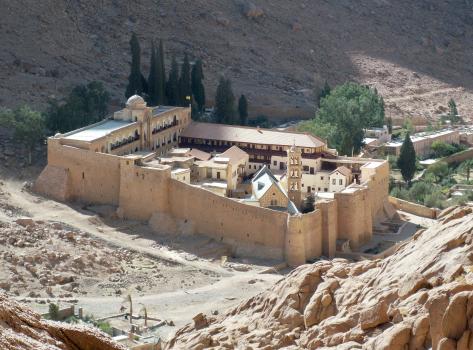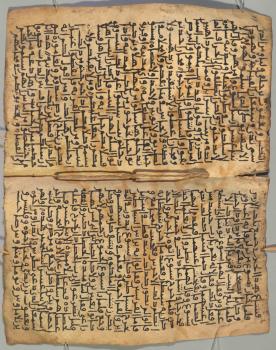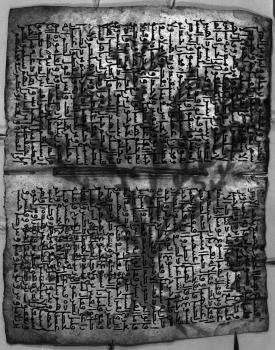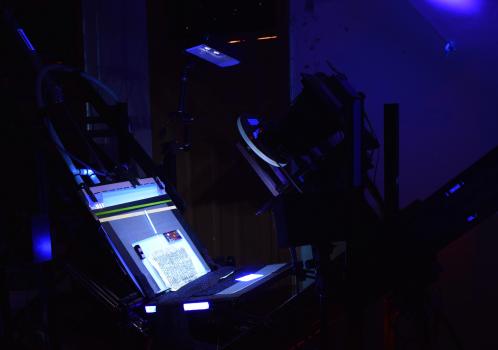Goals

The Sinai Palimpsests Project is a collaboration of St. Catherine’s Monastery of the Sinai and the Early Manuscripts Electronic Library, generously funded by Arcadia over a five-year period. Its primary goals are to:
- Make erased ancient texts in St. Catherine’s palimpsests legible using spectral imaging.
- Identify the erased texts and describe their paleography.
- Publish an online digital library of Sinai palimpsests featuring high-quality digital images that are searchable through an electronic catalog.
The Library of Sinai
Built between 548 and 565 CE, St. Catherine’s Monastery is the world’s oldest continually operating monastery, and its library holds an exceptional collection of manuscripts from the first millennium CE. Among these are more than 160 known palimpsests, the erased layers of which preserve unstudied texts from as early as the 4th century.
Palimpsests
Palimpsests are recycled manuscripts. When the need for a new text outweighed the value or usefulness of an older manuscript, ancient and medieval scribes would sometimes disassemble the older codex, scrape and wash its parchment folios to erase the ink, and re-use the old folios in a new codex, with new text written over the old. The erased layer of writing is normally faintly visible under the new writing, but not legible.


captured in UV illumination through a blue filter.
Full-page illustration of medicinal herb, 5th
century CE.
Spectral Imaging

Innovations in spectral imaging have made it possible to recover a large percentage of these erased texts, making legible again texts which were erased centuries ago. Spectral imaging involves capturing images under illumination with different wavelengths of light and then processing these images by sophisticated means to bring to light information, which is not readily discernible to the naked eye.
Recovering Ancient Erased Texts in Sinai
The application of state-of-the-art spectral imaging at St. Catherine’s Monastery is recovering lost chapters of history. The palimpsests of Sinai contain thousands of rewritten folios that preserve erased copies of classical, Christian and Jewish texts in ten languages (Greek, Syriac, Georgian, Arabic, Christian Palestinian Aramaic, Latin, Caucasian Albanian, Armenian, Slavonic, and Ethiopic) and in many ancient scripts. Some of these erased texts survive in no other form. Prior to the Sinai Palimpsests Project, only three of the 160 known palimpsests of Sinai had been thoroughly studied and published in scholarly editions.* Scholars participating in the project are making discoveries that expand the body of texts available to historians, linguists and paleographers, and provide new evidence for reconstructing the history of the monastery and of the many peoples who have visited it since its founding in the 6th century.
Access to Project Results
Please visit our research site, where students and scholars can browse, retrieve, and study items of interest for their research from our digital library of the palimpsests of St. Catherine’s Monastery.
__________________________
*Syriac 30, oldest surviving copy of the Christian Gospels in Syriac (4th/5th century). Published: W. Cureton, Remains of a Very Ancient Recension of the Four Gospels in Syriac, hitherto unknown in Europe (1858); F.C. Burkitt, Evangelion da-Mepharreshe: the Curetonian Version of the Four Gospels, with the Readings of the Sinai Palimpsest and the early Syriac Patristic evidence (2 vols., 1904); A. Hjelt, Syrus Sinaiticus (1930).
Georgian NF 13 & Georgian NF 55, only surviving manuscripts in the language and alphabet of Caucasian Albania, a kingdom that thrived in modern-day Azerbaijan from the 3rd century BCE to the 8th century CE. Published: J. Gippert, W. Schulze, Z. Aleksidze, and J.-P. Mahe, The Caucasian Albanian Palimpsests of Mount Sinai (2 vols. Brepols, 2008).




